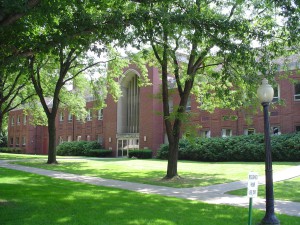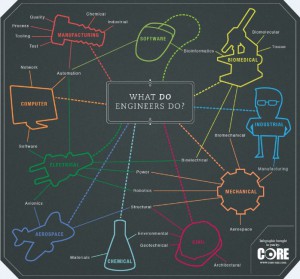
Last weekend, Grove City College hosted its annual Junior Crimson Day, and it made me think back to when I was a junior in high school. I didn’t know where I wanted to go to college or what I wanted to study, but I was beginning to look into engineering. At that point in my college search, I really didn’t know what engineering was or what engineers did. For me, ‘engineering’ seemed to be a catch-all term for people who were good at physics in high school or liked to tear computers apart in their spare time. I didn’t even know what the difference was between electrical and mechanical engineering! After talking to many students interested in engineering, I’ve come to realize this is a common problem.
Merriam-Webster defines engineering as “the work of designing and creating large structures or new products or systems by using scientific methods.” This definition is extremely vague, and rightly so! Within engineering, there are many types of engineering – such as mechanical, electrical, chemical or civil – and each type is almost completely different. Then, to make things more complex, there are many different applications within each type of engineering. Each application utilizes different skills and areas of expertise. For example, a mechanical engineering student could go into a career in designing the heating systems for buildings, working on machines in a factory, optimizing a valve in a fluid system or even selling engineering products – and that’s just naming a few possible careers! That’s one of the best parts of engineering. The skills that engineers learn can really be applied to any type of career – technical or non-technical. There have been a lot of students who have used their engineering degree to become doctors, lawyers or businessmen.
Electrical Engineering vs Mechanical Engineering
Grove City offers degrees in electrical engineering (EE) and mechanical engineering (MECE), which are generally considered the ‘core’ types of engineering because they can be applied to almost any career field. So then, what’s the difference between electrical and mechanical engineering, besides the obvious that EE deals with electrical components and MECE deals with mechanical assemblies? Electrical engineering is more abstract and conceptual, whereas mechanical engineering is more visual and hands-on. For instance, a professor from a different school once described the difference in terms of a robot. MECE’s are responsible for designing the body of the robots so it can easily move and function reliably, while EE’s are responsible for making the robot move and controlling its motion. This definition helped me a little bit, but I still didn’t completely understand the difference between EE’s and MECE’s.

I got a little bit more insight when I came to Grove City’s Junior Crimson Day. One of the professors here explained that, in general, electrical engineers are better at abstract concepts and tend to be very good at math (like perfect scores on the math section of the SAT’s). Mechanical engineers are also good at math, but like to be able to visualize problems and have probably grown up playing with LEGO’s and K’NEX. This explanation really helped me because I personally like to be able to visualize the forces being exerted on an object, but it’s frustrating to not be able to see what’s happening inside of a circuit or wire. Obviously, these are just generalizations about each type of engineering, but I have found that in many cases, they are true.
The main thing that influenced my decision to pick engineering was sitting in on both EE and MECE classes. It took me sitting in on one EE class to realize that it was not for me! I recommend sophomore level classes because they give a general picture of what to expect, without being completely over your head. I didn’t fully understand what was being taught in the MECE class, but I could understand the logic behind it and I identified with that way of thinking. If you’re torn between electrical and mechanical engineering, I highly recommend sitting in on some classes and talking with professors. Both are extremely helpful!
So What Exactly is Engineering?
With all of the different applications for engineering, what is the common denominator for engineering? I would argue, and most engineers would agree, that engineering is all about creative problem solving. In engineering classes, you learn how to think critically about problems and numerically develop different solutions to fix the problem. Engineering is all about weighing the options and optimizing the current resources for the best result. The problem and subsequent solution can take many different forms, but it all comes down to using problem solving skills to find creative solutions.
If you like math or science and love solving complex problems or puzzles, engineering may be a good fit for you! Engineering requires both detailed and out-of-the-box thinking to come up with the best solution for a problem. There are so many different things you can do with an electrical or mechanical engineering degree! I highly recommend talking with professors and learning about student projects to get a better idea of engineering.
